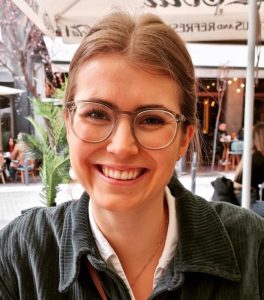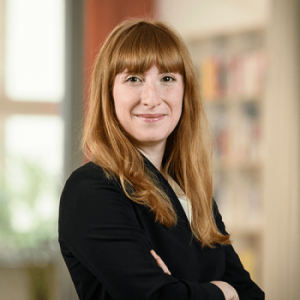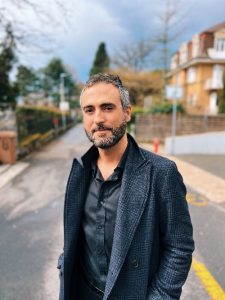Congratulations to the first round of winners of the 22/23 King’s Outstanding Thesis Prize!
Each year a limited number of awards are given to celebrate truly outstanding research and theses completed by King’s doctoral students. The prizes are nominated by the external examiners and are judged by a panel consisting of the College’s Director of Research Talent and the Chair of the Research Degrees Examinations Board.
Meet our winners:
Dr Jacob Gracie, Faculty of Arts and Humanities
I am very grateful to have received this award. Completing the thesis would not have been possible without the support of my supervisor, Dr. Jon Day, and the company of my friends and family. Thank you also to my examiners – Prof. Bettina Bergo and Prof. Josh Cohen – for their engagement and receptiveness to my project. I am grateful to have had the time to undertake the research for the thesis, which was hugely fulfilling and at no point followed a linear trajectory! Thank you to King’s and LAHP for the opportunity. Thanks also to the members of the KCL Fair Pay for GTAs campaign and all the PhDs, GTAs, and other students and staff who attended various meetings and events related to the campaign – it was a privilege to work and learn in your company over the last few years.
Dr Harriet Fagerberg, Faculty of Arts and Humanities
Prior to commencing a PhD in Philosophy on KCL and Humboldt’s joint PhD programme, Harriet completed an MA in Philosophy of Psychology at KCL and a BA in Philosophy, Psychology and Politics at Maastricht University College. Her PhD thesis – entitled ‘Disease, Dysfunction and the Brain’ – defended a new theory of pathology as a special kind of biological dysfunction, and applied it to the brain. Three chapters of Harriet’s thesis were adapted and published as journal articles in Philosophy of Science, Biology & Philosophy, and The European Journal for Philosophy of Science. After handing in her PhD in August of 2022, Harriet took up a Postdoctoral Fellowship on the Templeton Foundation funded project ‘Agency, Directionality and Function’ at Hunter College and The Graduate Center, City University of New York. She is currently working on the nature of biological function and whether psychiatric disorders should be understood as dysfunctions.
Dr Heather White, Faculty of Dentistry, Oral and Craniofacial Studies
 I am honoured to receive this thesis award and have my work recognised by King’s. My research explored the relationship between cranial sutures and skull morphology across mammalian taxa.
I am honoured to receive this thesis award and have my work recognised by King’s. My research explored the relationship between cranial sutures and skull morphology across mammalian taxa.
My PhD was completed in collaboration with the Natural History Museum, where I accessed museum specimens to build a comparative ontogenetic dataset spanning the phylogenetic breadth of Mammalia. Through a series of distinct and interlinked chapters I found that the development of cranial sutures was highly integrated with overall cranial morphology. Consequently, I proposed that developmental mechanisms shaping suture morphology are central to the evolution of mammalian cranial phenotypic diversity. I would particularly like to thank my supervisors for their support and enthusiasm throughout my PhD, Prof. Abigail Tucker and Prof. Anjali Goswami.
My research has led to many outreach opportunities which I am forever grateful for. These have included Nature Live talks hosted by the Natural History Museum, school talks, and NHM Lates. I have competed in the London final of FameLab, received a conference poster prize, presented my research in the prestigious D. Dwight Davis Award at the Society of Integrative and Comparative Biology conference, and have been invited to present my research at an upcoming conference symposium.
Following my PhD, I have completed a postdoctoral research position extending my work on cranial sutures into evolutionary time to study the synapsid to mammal transition. Additionally, I have used my quantitative morphometric skills to analyse the impact of plastic pollution on bird wing shape. Most recently, I have started a job as a Data Scientist at the Office for National Statistics working on the UN Sustainable Development Goals project. Finally, I would like to thank everyone who has been a part of my PhD journey, without whom this research would not have been possible.
Dr Aimee Cheesbrough, Faculty of Life Sciences and Medicine
 Before beginning my PhD, I studied Medical Engineering (MEng) at the University of Leeds. With an interest in stem cells and regenerative medicine and an eagerness to move into the Biosciences, I joined the BBSRC London Interdisciplinary (LIDo) DTP in 2017. My PhD project was co-supervised by Dr Ivo Lieberam at KCL Centre for Gene Therapy & Regenerative Medicine, and Prof. Wenhui Song at the UCL Centre for Biomaterials in Interventional Science. During this time, I developed an in vitro model of skeletal muscle function, made from a combination of electrospun nanofiber scaffolds and optogenetically controlled human iPSC-derived myofibers. I was fortunate to have this work published in Advanced Materials in March 2022. Towards the end of my PhD, I worked closely with colleagues at KCL to use this technology as a platform for modelling neuromuscular diseases. We developed a 96-well screening platform for identifying phenotypic variation in neuromuscular co-cultures generated from ALS patient-derived iPSC cell lines.
Before beginning my PhD, I studied Medical Engineering (MEng) at the University of Leeds. With an interest in stem cells and regenerative medicine and an eagerness to move into the Biosciences, I joined the BBSRC London Interdisciplinary (LIDo) DTP in 2017. My PhD project was co-supervised by Dr Ivo Lieberam at KCL Centre for Gene Therapy & Regenerative Medicine, and Prof. Wenhui Song at the UCL Centre for Biomaterials in Interventional Science. During this time, I developed an in vitro model of skeletal muscle function, made from a combination of electrospun nanofiber scaffolds and optogenetically controlled human iPSC-derived myofibers. I was fortunate to have this work published in Advanced Materials in March 2022. Towards the end of my PhD, I worked closely with colleagues at KCL to use this technology as a platform for modelling neuromuscular diseases. We developed a 96-well screening platform for identifying phenotypic variation in neuromuscular co-cultures generated from ALS patient-derived iPSC cell lines.
Outside of my PhD, I really enjoyed getting involved in public engagement activities. I spent 3-months doing an internship at The Royal Institution, where I worked as part of their Masterclass team to organise and deliver engineering, mathematics and computer science masterclasses to school children. I was lucky to be working there during December, during the lead-up to their famous BBC Christmas Lecture series which was very exciting! I was also involved with public engagement activities for KCL Stem Cells, where we developed a ‘Growing New Body Parts’ stand for the Royal Society Summer Science Exhibition.
Since finishing my PhD I have been working at Ivy Farm Technologies – a cellular agriculture biotechnology start-up based in Oxfordshire. I am really excited to be working in such an innovative sector and to be able to apply the skills and knowledge gained during my PhD to contribute to a better future for animals and the planet! I am truly honoured to have received the King’s Outstanding Thesis Prize and would like to thank all those who made my time at King’s so memorable – Thank you!
Dr Luis Alameda, Institute of Psychology, Psychiatry and Neuroscience
I studied medicine at the Universities of Sevilla, Lund and Florence, and trained in psychiatry and psychotherapy in Lausanne University Hospital (CHUV) where I specialised in early intervention in psychosis and started exploring various aspects on the link between childhood trauma and psychosis doing my thesis (MD) on this topic. From 2017 to 2022, I worked in South London and Maudsley as a Consultant psychiatrist, mainly in early intervention and treatment resistant on psychosis, while I did a PhD at the Department of Psychosis Studies, Institute of Psychiatry, Psychology & Neuroscience, King’s College London.
My PhD explores the nature of the association between childhood trauma and psychosis, covering epidemiological, clinical and molecular data, with the intent to improve the care of patients with psychosis who suffer from these experiences and to better understand the mechanisms involved. My research has helped a better understanding on the epigenetic mechanism linking trauma and psychosis; previously hypothesized but never explored, and has also opened new venues for clinical applications, such as the key role of anxiety, mood, and dissociation in this population; and the differential role of abuse and neglect, both in terms of clinical manifestations and epigenetic mechanisms.
Just after my PhD submission, I was appointed as the head of the Treatment and Early Intervention for Psychosis Program (TIPP) in CHUV, in Lausanne Switzerland, where I am applying my skills in early intervention learned at the Maudsley and expanding my research in Switzerland and beyond.
Dr Brittney Regal, King’s Business School
 Britt Regal’s doctoral research explored the role that organizational leadership cultures play in embedding co-production (citizen participation) in public services. Through examining six cases across three sectors, she drew conclusions about how certain leadership cultures impacted public service organizations’ engagement with citizens, particularly young people. Her supervisors, Dr Alexandra Budjanovcanin and Professor Ewan Ferlie, provided invaluable knowledge and expertise. She was also a recipient of the King’s Business School Collaborative Studentship.
Britt Regal’s doctoral research explored the role that organizational leadership cultures play in embedding co-production (citizen participation) in public services. Through examining six cases across three sectors, she drew conclusions about how certain leadership cultures impacted public service organizations’ engagement with citizens, particularly young people. Her supervisors, Dr Alexandra Budjanovcanin and Professor Ewan Ferlie, provided invaluable knowledge and expertise. She was also a recipient of the King’s Business School Collaborative Studentship.
During her PhD, Britt worked as a research assistant on the Horizon 2020 project, COGOV. She oversaw the delivery of case studies from partners across Europe and provided overarching analysis, alongside Professor Ferlie, on these case studies. She also supported the delivery of a toolkit for co-creation and provided analysis on the governing mechanisms fostering co-creation within the culture sector. To disseminate the findings from her PhD and COGOV, she hosted a day-long conference attended by professionals in non-profits as well as local government officers.
Previously, Britt worked in the education sector supporting schools and mentoring teachers at Teach First. She also worked as a secondary teacher in the United States. Currently, she is a research associate at King’s College London working on an ESRC-funded project overseen by the Productivity Institute. Within this project, she is exploring the transition to sustainable mobility alongside Professors Damian Grimshaw, Marcela Miozzo, and Jonatan Pinkse. Her research interests include organizational studies, public management, and public policy particularly in relation to collaborative innovation, citizen participation, and sustainable development administration.
Dr Giuseppe Brandi, Faculty of Natural, Mechanical and Engineering Sciences
I am humbled and grateful to have been awarded the King’s Outstanding Thesis Prize for my work on Multidimensional Data and Multiscaling Time Series. This achievement would not have been possible without the exceptional guidance and support of my supervisor, Professor Tiziana Di Matteo. Throughout my research, her expertise and encouragement were pivotal, particularly in bridging my previous research background in Economics and Econometrics with the field of Quantitative Financial Data Analysis. This mingling of research approaches had a profound impact on my research forma mentis, shaping my identity as what I refer to myself today, a Datametrician.
I also express my sincere gratitude to the members of my thesis committee, Professor Elsa Arcaute and Professor Andrea Gabrielli, for their valuable feedback and support for my future pursuits. My research has been significantly enriched by the feedback and insights received from the scientific community during workshops, seminars, and international conferences, thereby strengthening its potential impact. Furthermore, the collaboration with Yewno proved to be instrumental, highlighting the potential spillovers between academic research and the Fintech industry. I owe a debt of gratitude to my family and loved ones, whose constant encouragement and inspiration have been key to my success.
Moving forward in my career as a Research Associate in Climate Risk and Analytics at Imperial College London, I am eager to continue exploring the intersection of applied mathematics and real-world problems that have a tangible impact on society.
Dr Naomi Wright, Faculty of Life Sciences and Medicine
 It is an absolute honour to be awarded an outstanding thesis prize for my PhD in Global Surgery undertaken at King’s Centre for Global Health and Health Partnerships. What a wonderful and long journey it has been to get to this point.
It is an absolute honour to be awarded an outstanding thesis prize for my PhD in Global Surgery undertaken at King’s Centre for Global Health and Health Partnerships. What a wonderful and long journey it has been to get to this point.
By trade, I am a Paediatric Surgery Registrar, with my training post in the Southeast of England Deanery. However, I have always been interested in and hence actively participated in global health research at every opportunity throughout my career.
Prior to the PhD, I had undertaken a BSc in International Health at the University of Leeds in 2004/5 and an MSc in Global Health with Global Surgery at King’s in 2016. I had also undertaken a 1-year Royal College of Surgeons Research Fellowship alongside the MSc. During this year, I had established a paediatric surgery research network across sub-Saharan Africa (SSA) and collectively we had undertaken the first and largest multinational, prospective cohort study into children’s surgical outcomes across the region. This highlighted a huge disparity in survival compared to high-income countries, particularly for neonatal surgical conditions. For example, gastroschisis (a condition where the baby is born with their intestines protruding through a hole in the abdominal wall) had a 76% mortality across SSA compared to 2% in the UK (published in BMJ Global Health).
It is this research that led onto my PhD. It involved expanding the above prospective cohort study to include a wider range of congenital anomalies (also known as birth defects) and this time in low, middle, and high-income countries across the world (published in The Lancet ). This involved establishing the first truly global paediatric surgical research network with over 1500 children’s surgical care providers involved in the study from 74 countries. We ran the study in 12 languages. Team members have been involved in disseminating the results throughout the globe, both within the medical community and to the public through newspaper articles, social media, and television.
The second part of my PhD involved a hands-on clinical interventional study aimed at tackling the unacceptably high mortality from gastroschisis in seven paediatric surgery centres across Ghana, Zambia, Malawi, and Tanzania. This involved working with over 2000 team members, including surgeons, paediatricians, neonatologists, junior doctors, nurses, midwives, obstetricians, ministers of health, hospital managers, and other key stakeholders, to develop an evidence-based care bundle, and implement in across the seven tertiary hospitals and their referring hospitals and health centres.
Prior to the study the mortality from gastroschisis was 97%; at the end of the study the overall mortality had reduced to 65%. In real terms, 68 neonates survived from gastroschisis during the 2-year study, compared to just 3 neonates in the 2-years prior to the study. Many more have survived since too and further funding has been awarded to continue expanding the project. The study protocol has been published (Wellcome Open Research) and the results publication is in progress.
During the PhD, I had the opportunity to participate in and undertake numerous other associated research projects resulting in 15 publications, and many presentations at international conferences across the globe. I was blessed with winning the British Association of Paediatric Surgeons (BAPS) President’s Prize for best Clinical Research twice for the above work. I also helped organise the Global Initiative for Children’s Surgery (GICS) 3rd Global Congress in India, 2018.
Dr Francesca Ghirretti, Faculty of Social Sciences and Public Policy
 Francesca Ghiretti received her PhD from War Studies, King’s College London where she was awarded the Leverhulme Scholarship as part of the project ‘Interrogating Visions of a Post-Western World: Interdisciplinary and Interregional Perspectives on the Future in a Changing International Order’.
Francesca Ghiretti received her PhD from War Studies, King’s College London where she was awarded the Leverhulme Scholarship as part of the project ‘Interrogating Visions of a Post-Western World: Interdisciplinary and Interregional Perspectives on the Future in a Changing International Order’.
At King’s College London, she is also a fellow at the Centre for Grand Strategy.Currently, Francesca is an analyst at the Mercator Institute for China Studies (MERICS) where she covers EU-China relations, economic security, China’s engagement in the Global South, China’s footprint in Southern Europe and UK-China relations.
Francesca is also a Visiting Fellow at the European Council on Foreign Affairs (ECFR). Before joining MERICS, she worked as a Research Fellow Asia at the Istituto Affari Internazionali (IAI) in Rome leading a project on the Belt and Road Initiative in Italy. Previously, she also worked as a geopolitical analyst for CQS, a London-based hedge fund and as assistant to Jaap de Hoop Scheffer, former Secretary General of NATO.
Francesca’s Thesis, The securitization of Chinese foreign direct investments in the EU, researched the phenomenon of foreign direct investments (FDI) originating from China and flowing into the European Union has been receiving growing attention, particularly in light of the implications Chinese FDI carry that transcend economy.
This research seeks to give its contribution to the state of the art by looking at the phenomenon through the lens of the theory of securitisation of non-traditional security issues (NTS). Rather than measuring the nature, scope and impact of Chinese FDI in the EU, this project seeks to understand why the EU and two states, Italy and the UK, have begun to view Chinese FDI as a security threat and thus, transformed an economic matter into a security concern.

